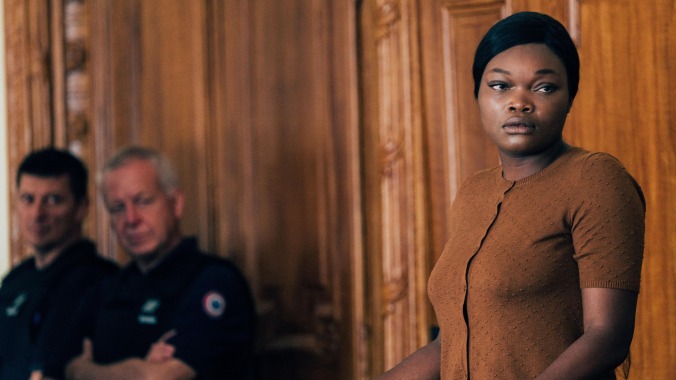Saint Omer film review: an empathetic portrayal of a woman accused of infanticide
Documentarian Alice Diop makes a confident and narratively rich feature film debut with Saint Omer, France's 2023 International Oscar selection

Saint Omer haunts from its first image. A woman holding a baby walks on the beach towards the sea while the loud waves overwhelm the soundtrack. In another place, another woman wakes up from a nightmare calling for her mother. In two precise scenes, director Alice Diop establishes the stakes of her story—France’s selection for the Oscars’ International Feature category—with clarity and confidence.
Soon we are launched deep into the stories of these women. First, we meet Rama (Kayije Kagame), a novelist and academic, grappling with her complex relationship with her depressive mother. She’s also attending the trial of a woman, Laurence Coly (Guslagie Malanda), accused of killing her infant daughter by abandoning her on a beach in the small town of Saint-Omer in Northern France. Diop, a documentarian making her narrative debut, was inspired by a real-life case. In fact, all the court scenes follow the exact transcripts of the trial. However, the film reaches its emotional apex by what Diop and her co-writers Amrita David and Marie Ndiaye choose to show or cut from those transcripts.
In the beginning, Diop lulls the audience into thinking we are in a textbook familiar courtroom drama. All the usual characters are present, from the calm, commanding judge to the slightly villainous prosecutor with the hollering voice to the defense lawyer with the exacting manners. The proceedings are also familiar; the choosing of the jurors, bringing out the defendant in handcuffs, requesting her to plead guilty or not guilty. But as we settle in for the expected, Diop and her cinematographer Claire Mathon pull the rug from under the audience and throw us into emotional turmoil.
Using long, uninterrupted takes that center the court officers, the witnesses, and most affectingly Coly herself, Diop unveils the real themes of her movie. This courtroom drama ripped from the headlines about an unfathomable crime is in fact an empathetic story about generational trauma and the hidden but irrevocable bonds between mothers and daughters. Diop sticks to the court transcripts for large swaths of the narrative, but chooses to omit, for example, when the prosecutor and arresting police officer launch into a psychological diagnosis of Coly based on her background and race. Instead, Diop drowns out their voices with those of chanting women. These men need not try to explain Coly when she is present and more than capable of doing so.
 Keep scrolling for more great stories.
Keep scrolling for more great stories.
